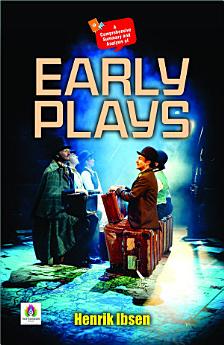A Comprehensive Summary and Analysis of Early plays: Demanding Ebook Book
Henrik Ibsen
Mar 2025 · Prabhat Prakashan
Ebook
9
Pages
reportRatings and reviews aren’t verified Learn More
About this ebook
Early Plays by Henrik Ibsen offers a captivating exploration of the nascent stages of Ibsen’s dramatic oeuvre, illuminating his evolving style, thematic preoccupations, and engagement with the socio-political climate of his era. This collection serves as a critical entry point into Ibsen's work, showcasing how his early plays set the stage for the profound masterpieces that would follow. The introduction of the collection underscores the importance of understanding Ibsen's body of work as an organic whole, where these initial plays not only reflect his artistic growth but also provide insights into the complex societal issues that preoccupied him. While perhaps less celebrated than his later works, these early dramas reveal the seeds of his genius, illustrating his deep concern with themes of identity, morality, and social responsibility. One of the key works included is Catiline (1849), which marks Ibsen's debut as a playwright when he was still an apothecary's apprentice. The play is steeped in the revolutionary fervor of the 1848-49 period and presents the character of Catiline as a deeply conflicted individual, grappling with the tensions between idealism and moral corruption. Rather than portraying him simply as a villain, Ibsen offers a nuanced depiction that invites audiences to reflect on the complexities of human motivation and the impact of societal pressures. Through this collection, readers gain a deeper appreciation for Ibsen's early works, recognizing them as essential to understanding his literary legacy and the socio-political issues that influenced his artistic vision.
About the author
Henrik Ibsen, a pioneering figure in modern drama, is the author of Early Plays, which provides an insightful examination of his formative works. This collection showcases Ibsen's evolving style and thematic concerns, reflecting his engagement with the social and political context of his time. The introduction emphasizes the significance of viewing these early plays as foundational to Ibsen's oeuvre, revealing the development of his artistic vision. One notable play, Catiline (1849), marks Ibsen's debut and captures the revolutionary spirit of the late 1840s while exploring the complex inner life of its protagonist. Through these early works, Ibsen lays the groundwork for his later masterpieces, making this collection essential for understanding his literary legacy and the intricate themes that continued to resonate throughout his career. Readers will find in Ibsen's early plays a rich tapestry of identity, morality, and responsibility, underscoring his status as a transformative figure in the world of theater.
Rate this ebook
Tell us what you think.
Reading information
Smartphones and tablets
Install the Google Play Books app for Android and iPad/iPhone. It syncs automatically with your account and allows you to read online or offline wherever you are.
Laptops and computers
You can listen to audiobooks purchased on Google Play using your computer's web browser.
eReaders and other devices
To read on e-ink devices like Kobo eReaders, you'll need to download a file and transfer it to your device. Follow the detailed Help Center instructions to transfer the files to supported eReaders.







